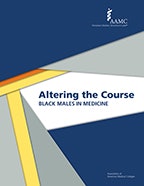
AAMC said that despite an overall increase in the number of black male college graduates over the past three decades, the number of black male applicants to medical school dropped to 1,337 in 2014 (from 1,410 in 1978). The number of enrollees also has declined, with 542 black male students enrolled in 1978, compared with 515 in 2014.
The report, Altering the Course: Black Males in Medicine, was presented at the National Medical Association’s (NMA) 112th National Convention in Detroit, the largest gathering of African-American physicians and health care professionals in the United States. Presidents of the nation’s historically black medical colleges and prominent leaders in the academic medicine community participated in a town hall to discuss the report and their perspectives on why there has been no progress.
The AAMC report provided perspectives of black pre-medical students, physicians, researchers, and leaders such as Louis W. Sullivan, MD, former secretary of the U.S. Department of Health and Human Services, on the reasons for the decline.
In interviews, 11 individuals cited several factors, , including unequal educational opportunities before college, the absence of mentors or role models in medicine, public perceptions of black men, career attractiveness, and lack of financial resources.
AAMC President and CEO Darrell G. Kirch, MD., said the report demonstrated that “we have to redouble our efforts in the health professions to improve the talent pipeline of African-American males in order to have a physician workforce that is representative of the population. The nagging challenge of health disparities requires all the best minds and perspectives. ‘Altering the Course’ is just the first step in identifying the problem. The AAMC looks forward to working with the NMA to begin implementing solutions.”
The report also highlights research and data from various sources to help explain the trends. Specifically, the report notes lower participation rates among black males in science, technology, engineering, and math fields, which affect the medical school applicant pool. It also cites a disproportionate number of young black men in underperforming K12 public schools that often have fewer resources, which can lead to negative school experiences.
“Talent is universal, but opportunity is not,” said Marc Nivet, EdD, MBA, AAMC chief diversity officer. “To that end, we’re starting to see a national movement get under way to engage young black males. Not only are there several programs to address the issue, such as the White House initiative ‘My Brother’s Keeper,’ but academic medicine is working within the community and partnering with minority-serving institutions — the largest feeder schools to medical school — to help develop the next generation of physicians.”














